Looking for a new tankless water heater in the Ottawa area? That’s a smart move. Before you buy, though, be sure you do your homework. Learn all about the best water heaters in Ontario and how they differ from hot water tanks vs. tankless. We simplify your research with this guide to tankless hot water heater function, benefits, and top brands.
Looking for a brand comparison? Skip the rest of this content to read our comparison of Navien vs Rinnai vs Bosch.
Table of Contents:
- What Is A Tankless Water Heater?
- How Does A Tankless Water Heater Work?
- Benefits Of Installing A Tankless Water Heater
- How Long Do Tankless Water Heaters Last?
- Tankless vs. Heat Pump Water Heater
- Gas. vs. Electric Tankless Water Heaters
- What Size Tankless Water Heater Do I Need?
- Tankless Water Heater Maintenance Tips
- Should I Choose Condensing Or Non-Condensing Tankless Water Heaters
- 4 Of The Best Tankless Water Heater Brands
- Navien vs Rinnai vs Bosch
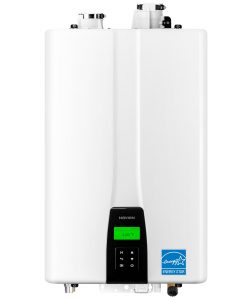 What Is A Tankless Water Heater?
What Is A Tankless Water Heater?
A tankless water heater can best be defined by what it isn’t. It isn’t like traditional hot water heaters, which heat cold water once it flows into a tank, and then continue to keep it hot for hours — or even days — until you are ready to use it. The process is energy-inefficient and wasteful. The water heater sizing depends on the demand of hot water for your home.
By contrast, a tankless heater avoids standby energy losses; it heats water only as needed, such as when you turn on the shower or faucet. Optionally – you can use a recirculating pump with your tankless unit for instant heat!
How Does A Tankless Water Heater Work?
- A tankless heater consists of a wall-mounted unit about the size of a suitcase, containing a burner (usually either natural gas or electric) and an internal computer. You can adjust the temperature setting by means of a thermostat.
- When you turn on your washing machine, faucet, or other hot water plumbing fixture, cold water is channeled into the tankless heater through the inlet pipe.
- The inflow of water is detected by sensors, which signals the computer to start the heating process.
- The computer sends a message to the internal burner to heat the incoming water.
- A heat exchanger circulates the water until it has reached the preset temperature indicated on the thermostat.
- The heated water flows out through an outlet pipe and makes its way along your home’s plumbing pipes to the spot where it is needed.
- The flow of hot water will continue as long as you wish, until the fixture is turned off.
Benefits Of Installing A Tankless Water Heater
The pros and cons of tankless water heaters are a lot more one-sided towards the benefits. Here are some of the pros of installing a tankless heater:
Offers Energy Efficiency. Because no standby energy losses are involved, a gas tankless water heater functions more efficiently than a hot water tank — saving energy, cutting your utility bills, and reducing your carbon footprint. Learn more about how a tankless water heater will save you money to help you decide. Natural Resources Canada reports that, on average, an Energy Star-certified water heater consumes 30 percent less energy than a conventional hot water tank. Although tankless heaters cost more initially, they are worth it.
Produces An Endless Hot Water Supply. Another advantage of a tankless water heater is that it can produce an endless supply of hot water whenever needed. You won’t ever again have to worry about running out or using up the contents of your water heater tank. This is especially good news if you’re tired of taking cold showers because someone else has used up all the hot water!
Lasts Longer Before Needing Replacement. You can expect a tankless water heater to last 20 years or longer, as opposed to an average lifespan of 8-12 years with a tank heater. (Constantly storing hot water shortens tanks’ lifespans.) This means you won’t have to lay out the cash to buy a new one so quickly.
Saves Space In Your Home. Because a tankless water heater is a trim rectangular box — instead of a big, clunky cylinder like a hot water tank — it doesn’t take up nearly as much room. You can have your tankless heater installed almost anywhere in your home, even a closet. Just make sure there is proper venting for a gas-powered water heater.
Less Chance of Flooding. The lack of storage tank means that there’s no risk of catastrophic flooding if something were to fail in the tank. The potential for water damage to your home is greatly reduced when you choose a tankless water heater, as they don’t store large quantities of water.
How Long Do Tankless Water Heaters Last?
You can expect a tankless water heater to last 20 years or longer, as opposed to an average lifespan of 8-12 years with conventional water heaters. (Constantly heating water and storing it at the desired hot water temperature shortens tanks’ lifespans.)
This means you won’t have to lay out the cash to buy a new one so quickly. The lifespan of even the best tankless water heater will vary depending on usage patterns, water quality (such as soft vs hard), and maintenance of the unit.
Tankless vs. Heat Pump Water Heater
Gas or electric tankless water heaters and heat pump water heaters might have comparable installation and operating costs, but there are several factors that you have to consider if you’re trying to decide between the two.
These include:
- Energy efficiency: both units are highly energy efficient, and much more so than conventional water heaters
- Cost-effectiveness: the energy savings over time can help offset the higher upfront cost of both types of water heater
- Space requirements: a tankless water heater is compact and wall-mounted, whereas a heat pump water heater is larger and may require more space
- Lifespan: a tankless water heater can last up to 20 years with good maintenance, while a heat pump water heater can reliably provide water for 10-15 years
- Rebates: both units may be eligible for rebates, such as the Canada Greener Homes Grant
Gas. vs. Electric Tankless Water Heaters
If you’re looking for the best tankless water heater type for your home, you’ll likely be choosing between a gas and electric tankless water heater.
Electric tankless water heater: generally easier to install, as they don’t require venting or gas lines, and can be installed closer to the point of use. This is the ideal choice for smaller homes, or if gas connection installation is impractical. Depending on what your electricity costs are, it might be pricier to run over time, but will likely have a lower upfront cost.
Gas tankless water heater: these typically have higher flow rates and can cater to larger households with higher hot water demands. They do require gas connections, venting, and adequate combustion air supply, which will increase the upfront cost. However, they often have a lower operational cost (as long as the gas prices in your area remain reasonable).
What Size Tankless Water Heater Do I Need?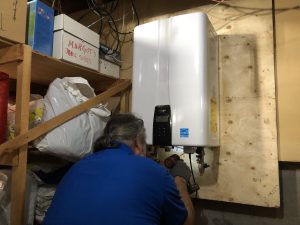
A key advantage of a tankless water heater is that it can produce an endless supply of hot water whenever needed. You won’t ever again have to worry about running out or using up the contents of your water heater tank. This is especially good news if you’re tired of taking cold showers because someone else has used up all the hot water!
Getting the best tankless water heater for your home will depend on the size of your household and the amount of water needed during peak hot water demand. The flow rate (GPM) is determined by adding up the flow rates in gallons per minute of all the fixtures you might use at once, such as showers, faucets, appliances, etc.
Other considerations you’ve have to make when choosing the right tankless water heater are:
- Energy source: there are many gas and electric models to choose from
- Efficiency: a more energy efficient water heater may have lower operating costs over time and help save you money
- Temperature rise: the difference between the temperature of the incoming cold water and the desired hot water temperature
- Future needs: if you’re planning on growing your family or adding on to your house in the next 20 years, you might consider choosing a unit that can accommodate future needs
Tankless Water Heater Maintenance Tips
Even the best tankless water heater will underperform if it’s not properly cared for. Proper maintenance is essential if you want to maximize the lifespan of your new tankless water heater installation. Here are some tips on how to get the most out of your tankless water heater:
- Flush the System: Sediment and mineral buildup can occur over time, affecting the performance of the unit. Flushing the system annually helps remove these deposits. Follow the manufacturer’s instructions for flushing or call in a trusted Hot Water Ottawa plumber if you’d prefer a professional to handle it.
- Inspect and Clean Filters: Tankless water heaters have filters that prevent debris from entering the unit. Regularly inspect and clean these filters to ensure unrestricted water flow.
- Check for Leaks: Regularly inspect your tankless water heater and its connections for any signs of leaks. Addressing leaks promptly will prevent potentially catastrophic water damage.
- Monitor Water Pressure: Excessive water pressure can strain the unit and lead to premature wear. Use a pressure gauge to monitor the water pressure and ensure it remains within the recommended range specified by the manufacturer.
- Check Venting System: If your tankless water heater is gas-powered, ensure that the venting system is free from obstructions and in good condition. Improper venting can lead to safety hazards, so it’s essential to inspect it regularly.
- Schedule Professional Maintenance: If nothing else, scheduling annual maintenance with a qualified technician will ensure that. They can perform a thorough inspection, clean the unit, and address any potential issues before they escalate.
Should I Choose Condensing Or Non-Condensing Tankless Water Heaters
Although the two types cost about the same to buy, condensing tankless water heaters use fuel more efficiently than non-condensing versions. The reason is that a condensing vs. non-condensing tankless water heater captures and recycles residual heat, which is leftover from the heating process. As a result, it will reduce your operating costs.
This is why we ONLY provide condensing units to the people of Ottawa.
Condensing tankless water heater = approximately 96-98 percent efficiency.
Non-condensing water heater = approximately 80 percent efficiency.
4 Of The Best Tankless Water Heater Brands
At Hot Water Ottawa, our Kanata water heater experts recommend the following brands. They are among the best tankless water heaters on the Barrhaven market today.
Navien Tankless Water Heater
Navien is a relatively new manufacturer, which offers only two tankless water heater lines — standard and upscale. However, their highly energy-efficient products are certified by both Energy Star and LEED. They recently opened a US-based plant. There are many outstanding Navien tankless water heater reviews.
Noritz Tankless Water Heater
Noritz America is a subsidiary of Japan’s Noritz Corporation, active in the water heater field for 70 years. Their tankless water heaters boast advanced features such as Wi-Fi compatibility, dual heat exchangers, and top-mounted water connections (to permit easy replacement of your old hot water tank).
Rinnai Tankless Water Heater
Rinnai tankless water heaters are known for their high performance, reliability, and generous warranty. This is an excellent brand when you would like to run several hot water fixtures at once. Their higher-end water heaters are certified by Energy Star, and the newest models are Wi-Fi capable.
Bosch Tankless Water Heater
Bosch is a famous, long-established engineering firm, which manufactures its residential water heaters in Europe. The company offers high-quality gas tankless water heaters at several price points.
Navien vs Rinnai vs Bosch
Navien
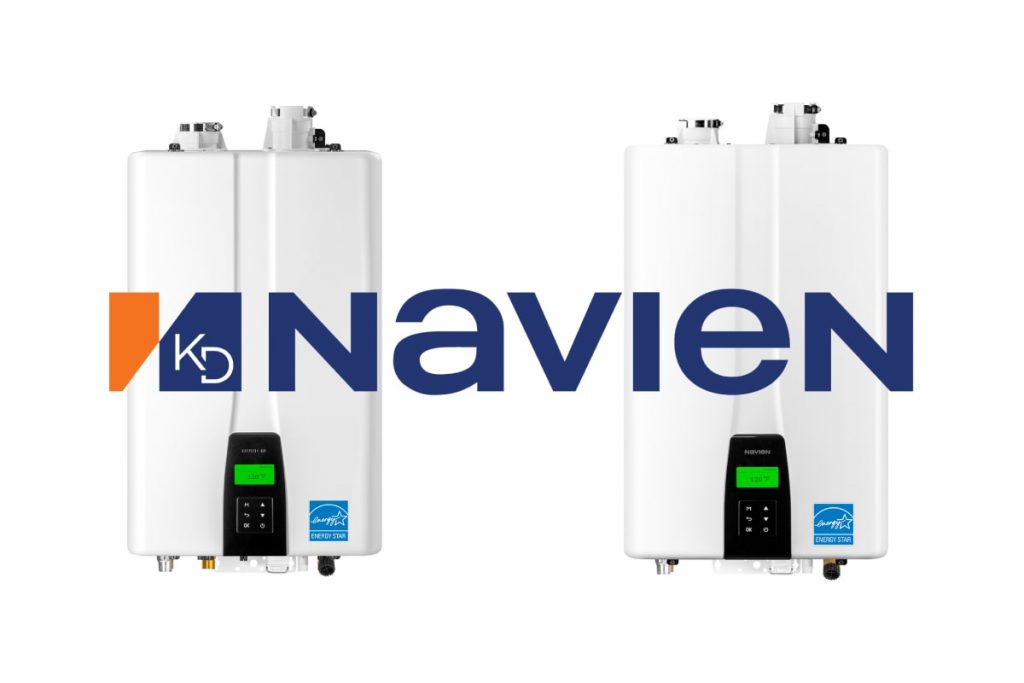
Navien is a reputable brand known for its advanced tankless water heater technology and energy-efficient solutions. With their impressive energy efficiency ratings, Navien tankless water heaters are among the most cost-friendly options available. These units are equipped with smart technology, allowing for easy temperature adjustments and remote monitoring.
Navien water heaters are designed to be eco-friendly, reducing greenhouse gas emissions and promoting sustainability. For homeowners seeking a high-performing and cost-effective tankless water heater, Navien is an excellent choice.
Features
- Field convertible gas system
- Ultra condensing efficiency
- Dual stainless steel heat exchangers
- Low NOx emissions (20ppm)
- 2” PVC venting up to 75 feet
- ComfortFlow built-in recirculation system
Most Efficient System
Navien NPE-210A2 is designed to optimize energy efficiency. It’s condensing models utilize innovative heat exchanger technology to capture waste heat, providing efficient heating and reduced energy consumption. NPE-210A2’s high-efficiency ratings (97% AFUE) make their tankless water heaters an eco-friendly and cost-effective choice for homeowners seeking long-term energy savings.
Most Cost Friendly
Navien offers a budget-friendly tankless water heater option in NPE-180A2. It delivers reliable hot water performance (150,000 BTU/h) at an affordable price. Homeowners will find this Navien unit can fit their budget without compromising on quality or efficiency. With Navien’s cost-friendly solutions, upgrading to an NPE-210A2 tankless system becomes accessible to a wider range of customers.
Rinnai
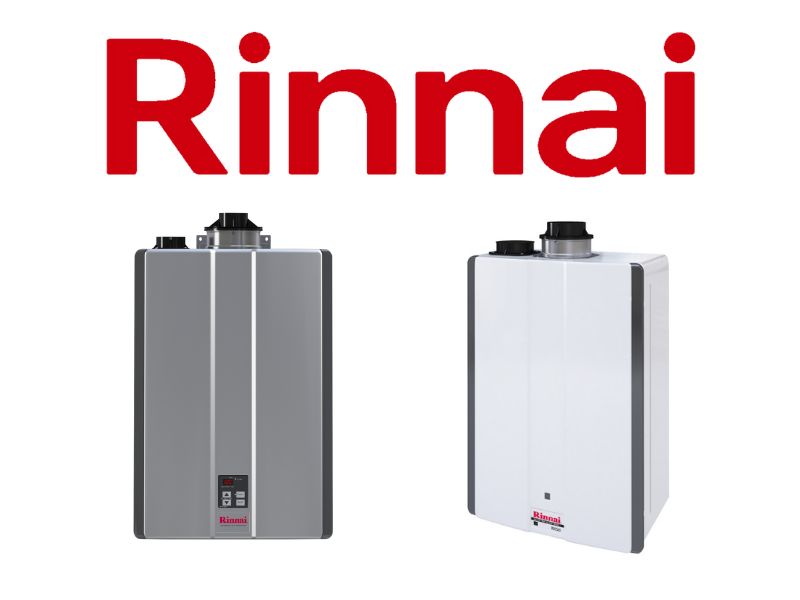
Rinnai is a leading brand in the tankless water heater market, offering high-performance units that combine efficiency and durability. With a focus on energy efficiency, Rinnai water heaters help reduce energy consumption and lower utility bills.
Their systems are equipped with innovative features like Wi-Fi connectivity and digital temperature control, allowing users to customize settings for optimal comfort. Rinnai’s commitment to quality and reliability ensures that their tankless water heaters are built to last, making them a cost-friendly investment in the long run.
Features
- Sleek, modern design
- Energy Star™ certified
- Smart-Circ™ Intelligent Recirculation™ technology
- Last up to twice as long as tank hot water heaters
- Isolation valves for extra protection
- Natural gas or propane fuel
Most Efficient System
Rinnai’s RSC water heaters are renowned for their energy efficiency. Their RSC condensing models capture waste heat and utilize it to preheat incoming water, maximizing efficiency and reducing energy consumption. With superior energy efficiency ratings (0.91 UEF) and an Energy Star rating, the RSC tankless water heaters are among the most environmentally friendly and cost-efficient options in the market.
Most Cost Friendly
Introducing the Rinnai RUCS Series, where budget-friendly tankless water heater options meet uncompromising performance (160,000 BTU) and quality. Emphasizing cost-effectiveness, this series ensures reliable hot water and long-term savings without sacrificing excellence, even in their more economical models.
Bosch
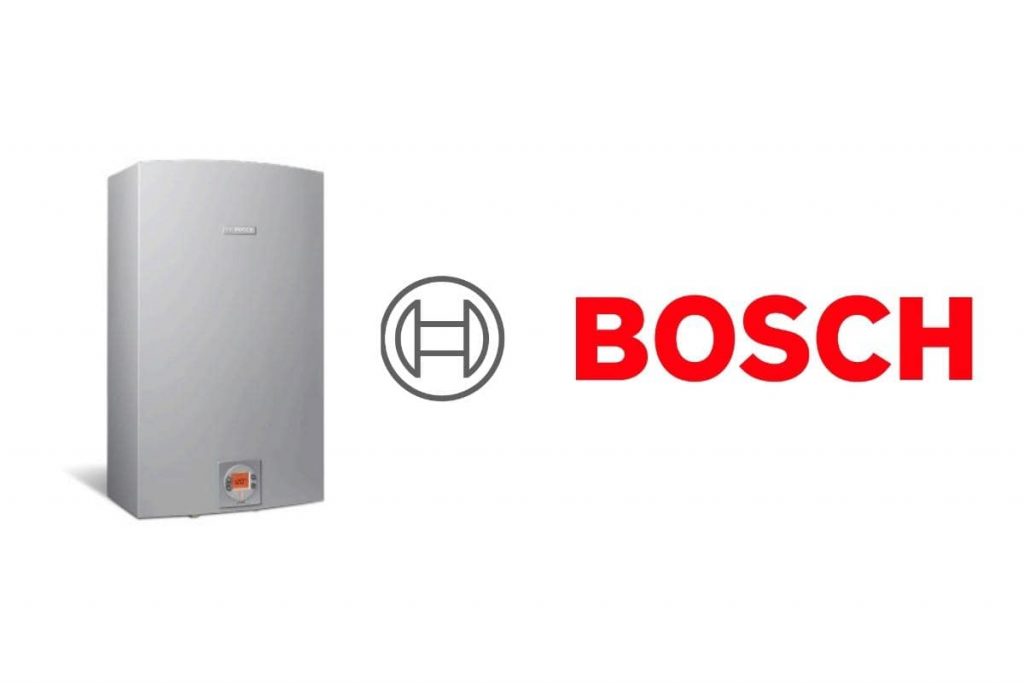
Bosch is a well-established and trusted brand that offers a range of efficient and reliable tankless water heaters. With a commitment to innovation and cutting-edge technology, Bosch tankless water heaters provide a constant supply of hot water while minimizing energy consumption. Their tankless systems are designed to be highly efficient, helping homeowners save on energy costs and reduce their environmental impact.
Bosch tankless water heaters are known for their compact design, making them suitable for homes with limited space. Additionally, their user-friendly controls and advanced safety features ensure a hassle-free and safe experience. Whether you need a tankless water heater for residential or commercial use, Bosch has a solution that offers the most efficient system at a cost-friendly price.
Features
- Space-saving, state-of-the-art tankless design
- Ultra efficient condensing technology with UEF up to 0.95
- Wi-Fi accessory & App increases functionality
- Top water connections for easy tank replacement
- Ultra low NOx Certified
- Non-condensing up to 24 units
- Available in NG and LP configurations
- Digital display for accurate temperature setting
Most Efficient System
Bosch Greentherm 9000 Series is designed with energy efficiency (0.95 UEF) in mind. Their high-efficiency burners and condensing technology maximize heat transfer and reduce standby heat loss, resulting in significant energy savings. With industry-leading efficiency ratings, the Bosch Greentherm 9000 Series minimizes energy consumption and lower utility bills, making them an eco-friendly and cost-effective choice for homeowners.
Most Cost Friendly
The Bosch Therm 830 ES caters to various budgets without compromising on quality. This cost-friendly unit provides excellent value for money, delivering reliable hot water performance (175,000 BTU/Hr) without breaking the bank. Homeowners can find the Bosch Therm 830 ES that suits their needs and budget, making them an economical and practical solution for hot water requirements.
We Carry The Best Water Heaters
Now you have the facts on the best tankless water heaters. Where do you find these uber-efficient appliances? Call Hot Water Ottawa, of course. Our expert Barrhaven water heater team is here to help you choose a tankless water heater that will give you the best performance.
Not yet ready to buy? No worries! Just rent a tankless water heater.

